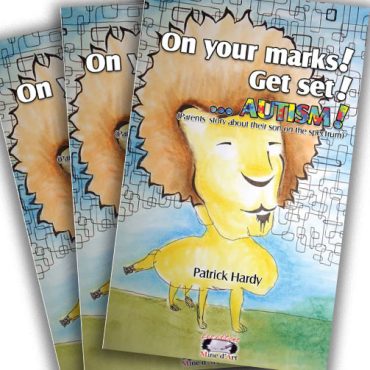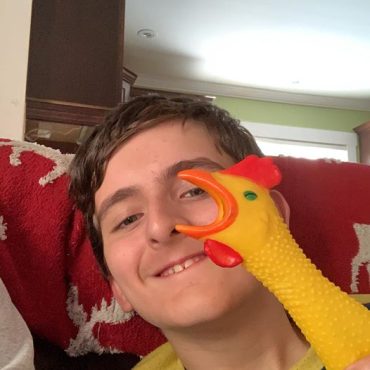A book for parents and adults interested in learning more of the spectrum of autism
While creating a book series that demonstrates the challenges and difficulties of living on the spectrum of autism through the life experience of our son, I realized that I did not have anything for the new parents who have just received an Autism diagnosis for their children and do not know where to go or what to do.
This situation, we experienced it. We have been there, we know what it feels like to be in the dark for quite some time before the services kick in and the ball starts rolling.
That is why I wrote this book, for parents to see what our experience was like and what happened after the services, for our son, started and how well he is doing. I start the story at birth, because it is where it actually started, and go on the the 8th grade. Throughout those years, there were challenges, sad moments, but also, many miracles and happy times.
Explore this book and this little story of new parents and a kid on the lower level of the spectrum and all of the wonderful things that happened to this family.
The book was originally written in french and is currently being translated for release.
A new application offers augmented reality for the book “My friend Sam plays with Damian”.
This application is available for Android tablets for now and is free.
Here is a video demonstrator of the application:
The people of Studio Vent d’Est have made the decision to offer this application for free. They take the mission of the “My Friend Sam” books to heart and offer children and parents alike the opportunity to interact with Sam and Damian as they manifest in 3D on your android tablet. This new technology therefore allows children to admire the illustrations in interactive ways and to see their characters in motion.
To download the free app, you can do so by clicking on this button:
Download FREE appStudio Vent d’Est had so much fun working on the project and are so keen on sharing the message of autism awareness that they are looking to create a new project with the third book titled: “My friend Sam goes to school “. They also want to develop the application for the iOS version. To do this, they need software to which they do not currently have access.
This article has been taken from www.theautismsite.com and I believe that some myths need to be broken.
Here is a list of 10 myths that surround autism:
Myth: Autism is a new condition
Truth: While the prevalence of autism is on the rise, autism is not a new condition. It was first described by scientist Leo Kranner in 1943. The earliest recorded descriptions of people exhibiting autistic behavior were documented in 1799.
Myth: Autism is caused by “Refrigerator Moms”
This idea was created and popularized in the 1950’s when moms’ so-called “emotional frigidity” was blamed for the development of autism. It’s simply not true, and is totally unfair to the mothers of these special kids. Autism has nothing to do with parenting.
Myth: Autism is caused solely by environmental factors
The exact cause of autism is not known for certain. It’s believed that genetics plays a role in the appearance of autism. Studies have shown that parents whose first child has autism are more likely than the general population to have a second child with autism.
Myth: Autism only affects men
While autism is certainly more prevalent in men and boys, it isn’t solely a male condition. One in four people with autism are women and girls. It’s unclear what causes the uneven male-to-female ratio, but the current prevailing theory suggests that a nature vs. nurture issue makes diagnoses in girls and women less common.
Myth: Autism is caused by vaccines
There is no scientific proof that shows that vaccines cause autism. A 1998 study linking autism with vaccinations has been disproved and retracted. You can read more about childhood vaccines and their impact on child health in Childhood vaccines: Tough questions, straight answers by the Mayo Clinic.
Myth: Autism is a mental health condition/mental disability
Autism is a neurological disorder. Studies of people with autism show they have abnormalities in brain structure and neurotransmitter levels. It is not a mental disability, as people on the autism spectrum show a wide range of intellectual abilities.
It’s important to remember that “autism” is a spectrum and what is difficult for one individual is simple for another. Each case is different.
Myth: All people with autism have savant abilities
While people with savant abilities and autism often attract considerable attention, it’s not true that everyone who has autism will have these gifts. It is true that savant abilities have a higher prevalence among those with autism than neurotypicals, representing about 1 or 2 in 200 individuals in the autistic population. The spectrum of autism is wide and diverse, and simply having autism does not imply inherent savant abilities.
Myth: Repetitive or ritualistic behaviors should be stopped
One of the classic symptoms of autism is repetitive and ritualistic behaviors, according to the Diagnostic and Statistical Manual of Mental Disorders (DSM IV). While these behaviors can seem strange, the serve an important purpose of calming and reassuring people with autism.
Unless these behaviors are interfering with family life or prevent the individual with autism from functioning independently, they should not be stopped. Children might outgrow repetitive behaviors in time, but it’s not certain.
Myth: People with autism cannot feel empathy or love
It’s not that people with autism can’t feel empathy, but rather that they express it in ways that are harder for neurotypicals to understand. People on the spectrum often struggle with processing social signals and body language, which is the root of this insidious misconception.
A recent New York Times feature on a couple with autism has shown the world what many with autism already know: that autism doesn’t preclude them from being amazing partner, parents, or friends.
Myth: Autism can be cured
While people with autism can be taught to cope with a neurotypical world, there is currently no way to cure someone of autism. Some with higher-functioning autism have even said they would not want a cure, because it is integral to who they are.
Read more at http://blog.theautismsite.com/ten-autism-myths/#8C7sPqV7obyjY7vD.99





